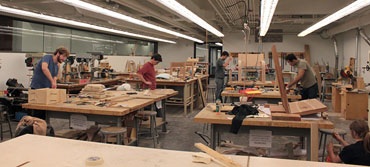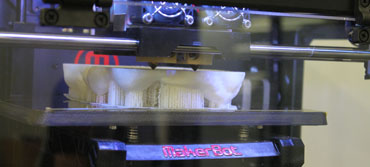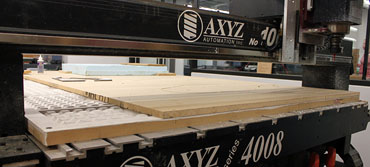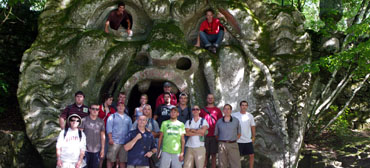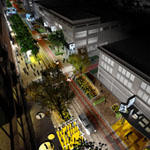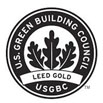Please see the Graduate Catalog for the complete list of courses for each concentration.
Graduate courses within the Master of Design Studies program include the following:
Core Courses
ARDS 67203 — Methods of Design Inquiry (Hybrid)
Introduces practical, theoretical, and methodological strategies for design-related
research. Students learn frameworks for framing inquiry, collecting evidence, and
articulating arguments that inform advanced design practice.
ARDS 68003 — Design Leadership (Hybrid)
Explores conceptual and theoretical perspectives of leadership in design. Emphasis
is placed on managing design processes, methods, and organizations while understanding
design as a form of thought leadership in contemporary practice.
ARDS 69006 — Advanced Design Studio I
A topical design studio investigating complex environmental design challenges. Students
synthesize research and theory into innovative design proposals that connect architecture,
place, and culture.
ARDS 69106 — Advanced Design Studio II
Continuation of Advanced Design Studio I with emphasis on cross-disciplinary strategies
and strategic design planning. Students refine their capacity to respond to sociopolitical,
economic, and environmental drivers shaping the built environment.
ARDS 69206 — Graduate Residency
An experiential learning course integrating design knowledge and theory in a professional
setting. The residency fosters applied learning, career development, and collaboration
with industry partners.
ARDS 69906 — Capstone Project (Hybrid, proposed for AY 26-27)
A culminating independent project that synthesizes research, design, and reflection.
Students work with a faculty mentor to pursue a self-directed investigation demonstrating
advanced design thinking and communication skills.
(This 6-credit course may be taken in place of the Graduate Residency.)
Health and Wellness Design
ARDS 68503 — Health and Wellness in the Built Environment
Examines how environmental factors influence human health and well-being. Students
analyze physiological and psychosocial aspects of design across building types such
as healthcare, workplace, housing, and educational environments.
Approved Electives (9 credits) may be selected from:
HDFS, EXSC, OCTH, PBHL, or SUST courses in consultation with the Graduate Coordinator.
Integrated Wood Design
ARDS 68303 — Wood Theories, Tectonics, and Environmental Response
Investigates wood as a renewable design material through theoretical, technical, and
aesthetic inquiry. Emphasizes tectonics, structure, performance, and sustainability.
ARDS 68403 — Advanced Wood Production Processes
Explores fabrication and construction processes for industrial and architectural wood
products. Students simulate design and assembly scenarios using engineered and hybrid
timber materials with emerging fabrication technologies.
Approved Electives (6 credits) may be selected from CVEG, MEEG, INEG, ENDY, SUST, or Forestry programs (UAM) with advisor approval.
Historic Preservation Design
ARDS 65003 — History and Theory of Preservation Design I
Introduces key ideas, frameworks, and debates in architectural conservation and preservation
theory. Students examine how history and context inform contemporary design interventions.
ARDS 65203 — History and Theory of Preservation Design II
Continues advanced study in preservation design, focusing on adaptive reuse, digital
documentation, and cultural heritage policy.
Additional Electives (6 credits) include one History of the Designed Environment course and one Specialized Component Elective with advisor approval.
Resiliency Design
ARDS 68103 — Cities and Public Good
Studies infrastructure and urban systems as interdependent socio-technical frameworks.
Students explore concepts such as energy transitions, value capture, and environmental
justice through analytic frameworks in socio-technical systems theory.
ARDS 68203 — Vocabularies of Context Production
Explores new spatial and organizational formats—from ecosystems to infrastructure
networks—emphasizing interactivity, modulation, and emergence as components of resilient
design.
Additional Electives (6 credits) may include:
SUST 51003 Foundations of Sustainable and Resilient Systems and SUST 52003 Decision Making, Analysis, and Synthesis in Sustainability.
Retail and Hospitality Design
HOSP 46603 — Hospitality Management Capstone
Focuses on strategic and operational aspects of hospitality management. Students integrate
financial, cultural, and environmental considerations in the design of service environments.
HOSP 56503 — Global Travel and Tourism Management
Examines global tourism systems and their implications for hospitality management,
branding, and experience-based design.
ISYS 53603 — Business Analytics
Introduces data analysis and decision-support tools for managing operations and marketing
within the retail and hospitality industries.
Approved Electives (3 credits) in MKTG or SCMT (Marketing, Retail, Consumer Research, or Supply Chain) are chosen with advisor approval.
Advanced Design (proposed for Fall 2026)
(Pending final approval from the Arkansas Division of Higher Education)
Elective Courses — 12 credits
Students pursuing the Advanced Design concentration customize their curriculum by
selecting from approved courses in advanced computation, fabrication, and digital
methods, such as:
- Computational Design Foundations (AI, Parametric, and Data-Driven Design)
- Emerging Technologies in Design Practice (XR/VR, Robotics, Sensors)
- Design Research Integration Seminar (Evidence-Based Design and Analysis)
- Human-Centered Systems and Digital Ecologies (Adaptive and Interactive Environments)
All courses emphasize experimental methods and hybrid delivery options (less than 50% online).

